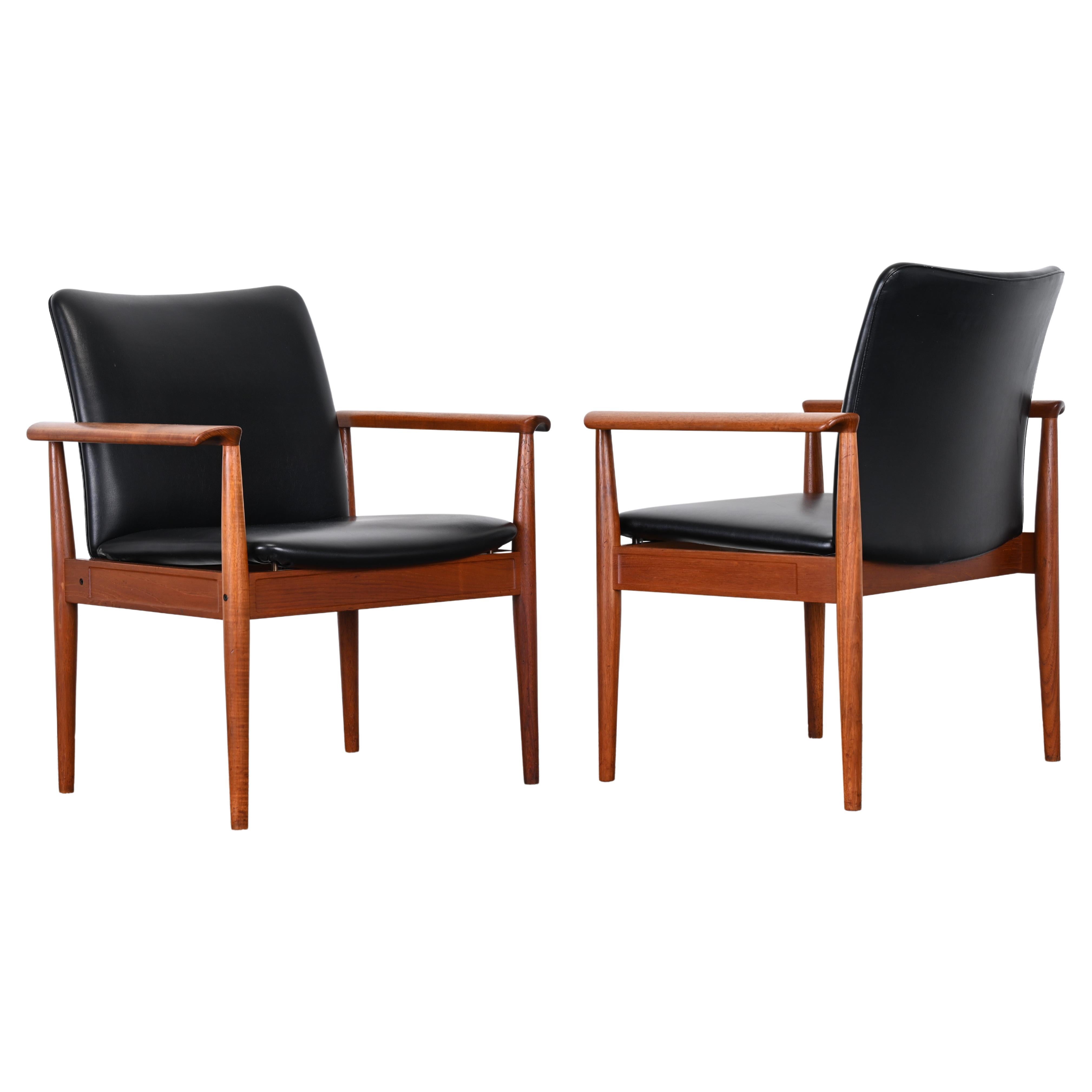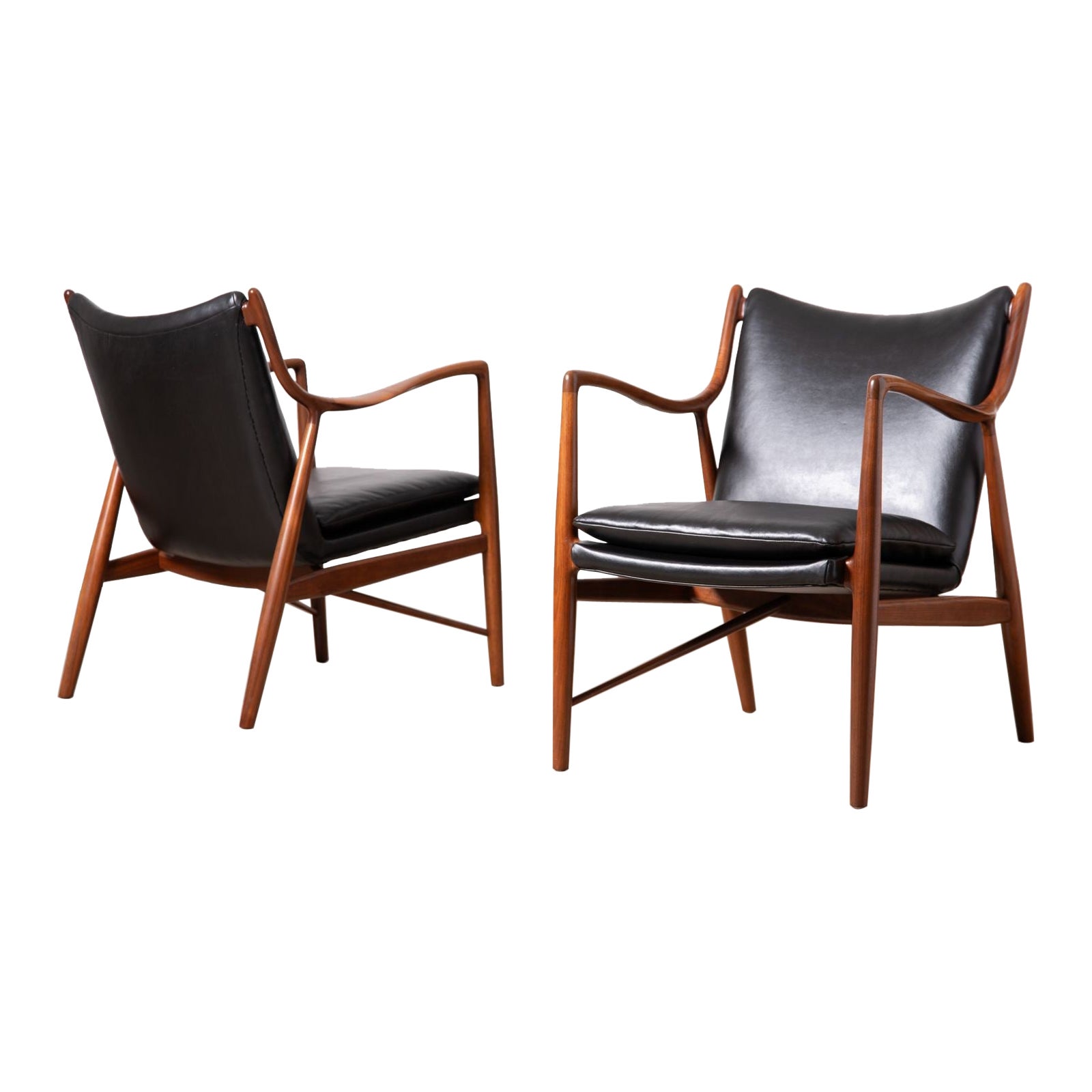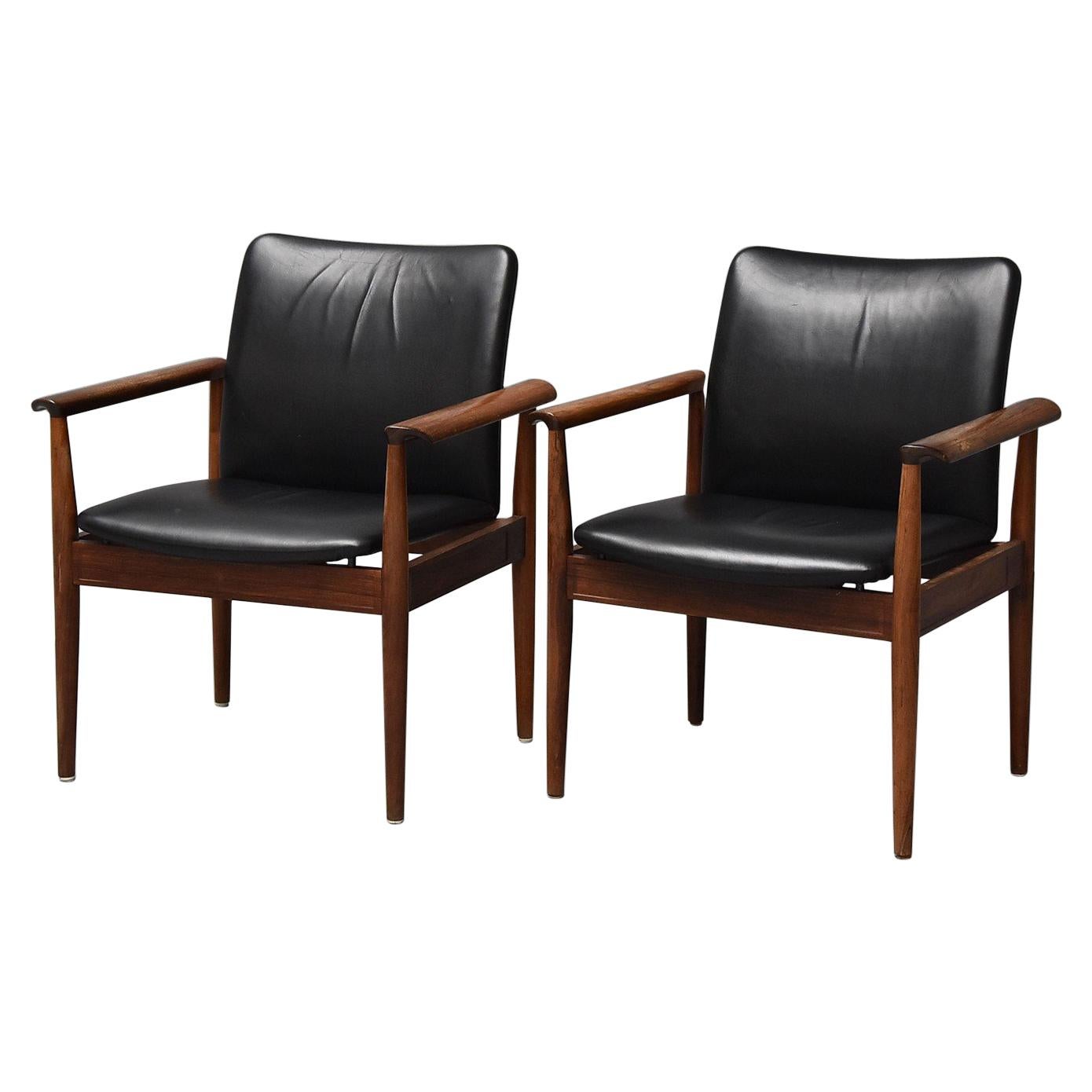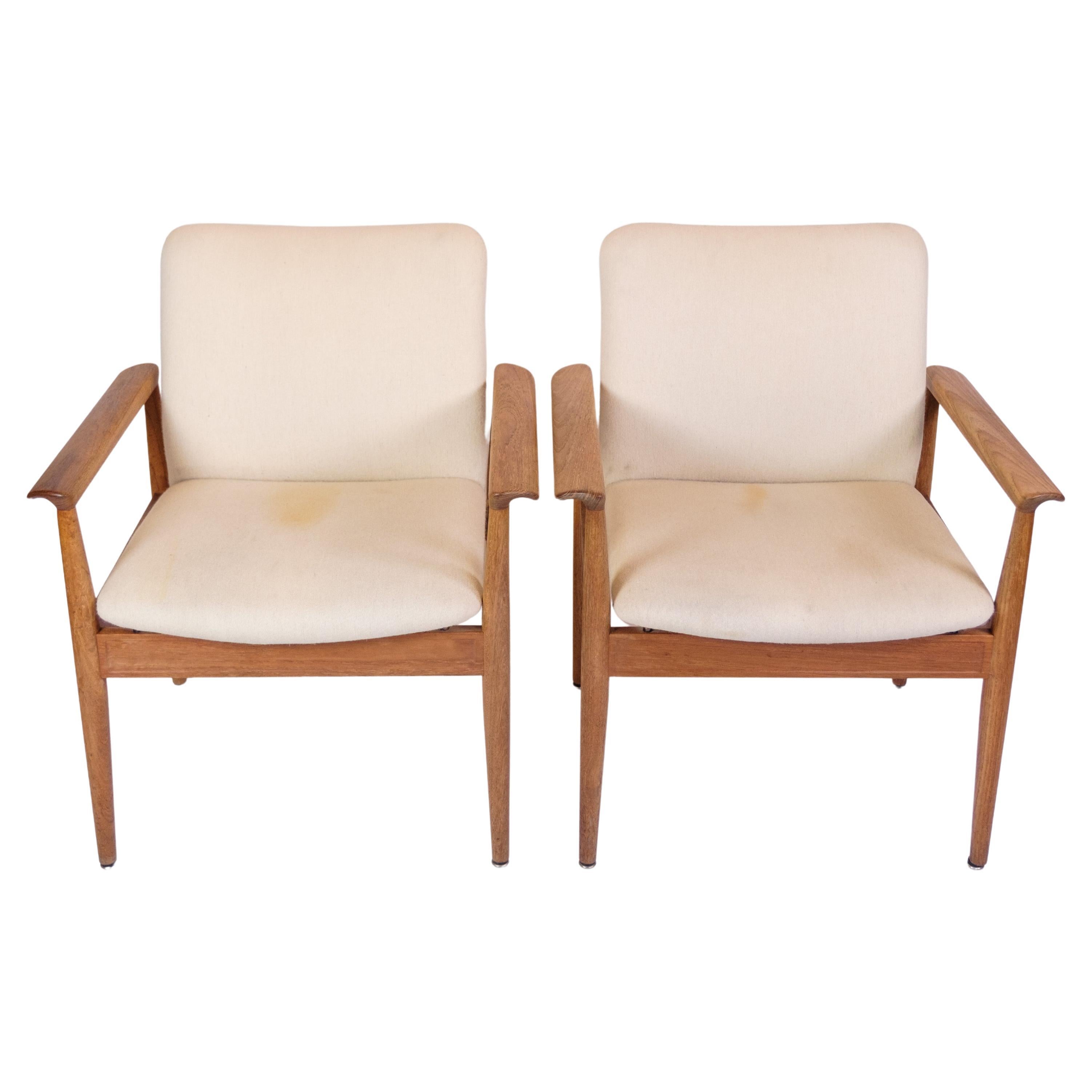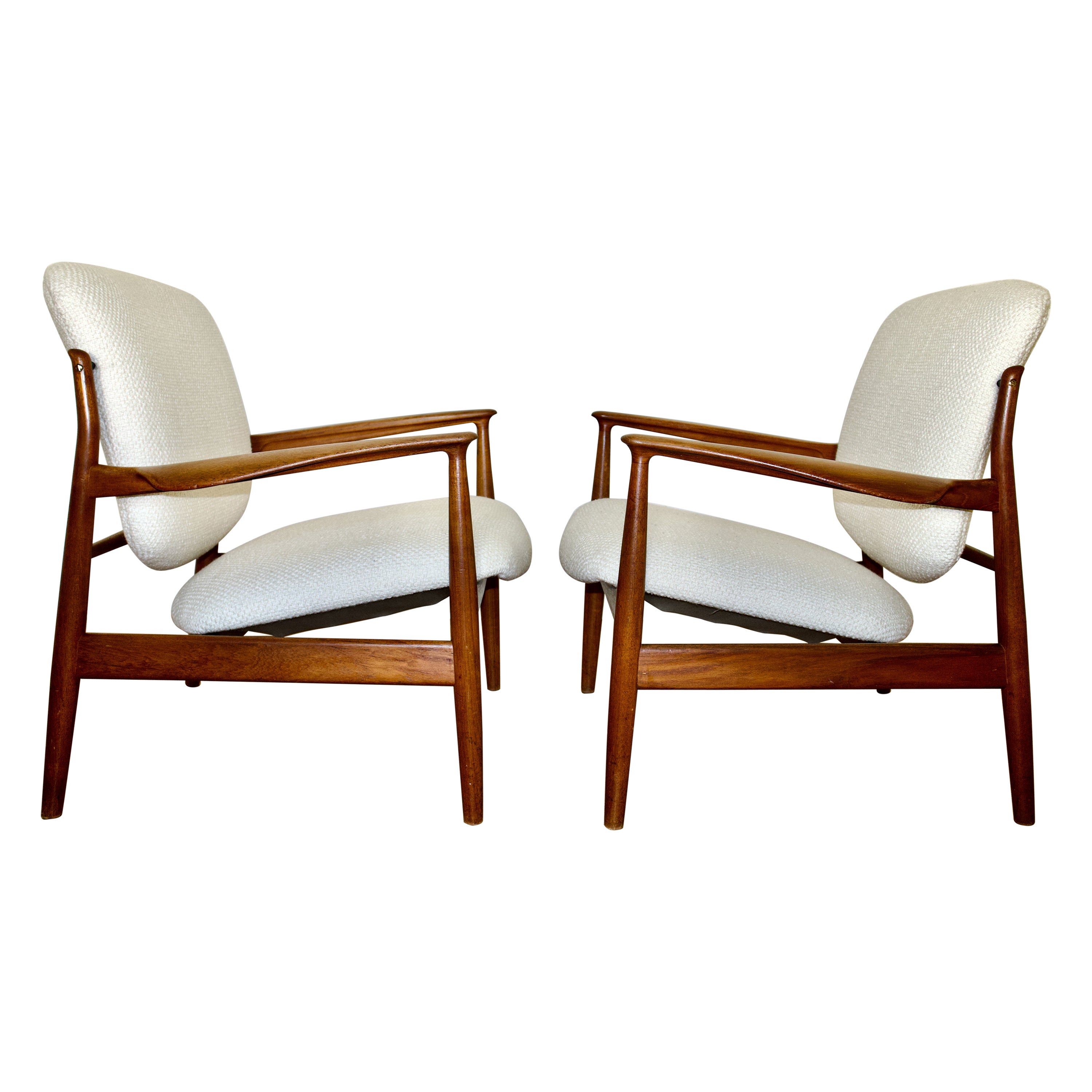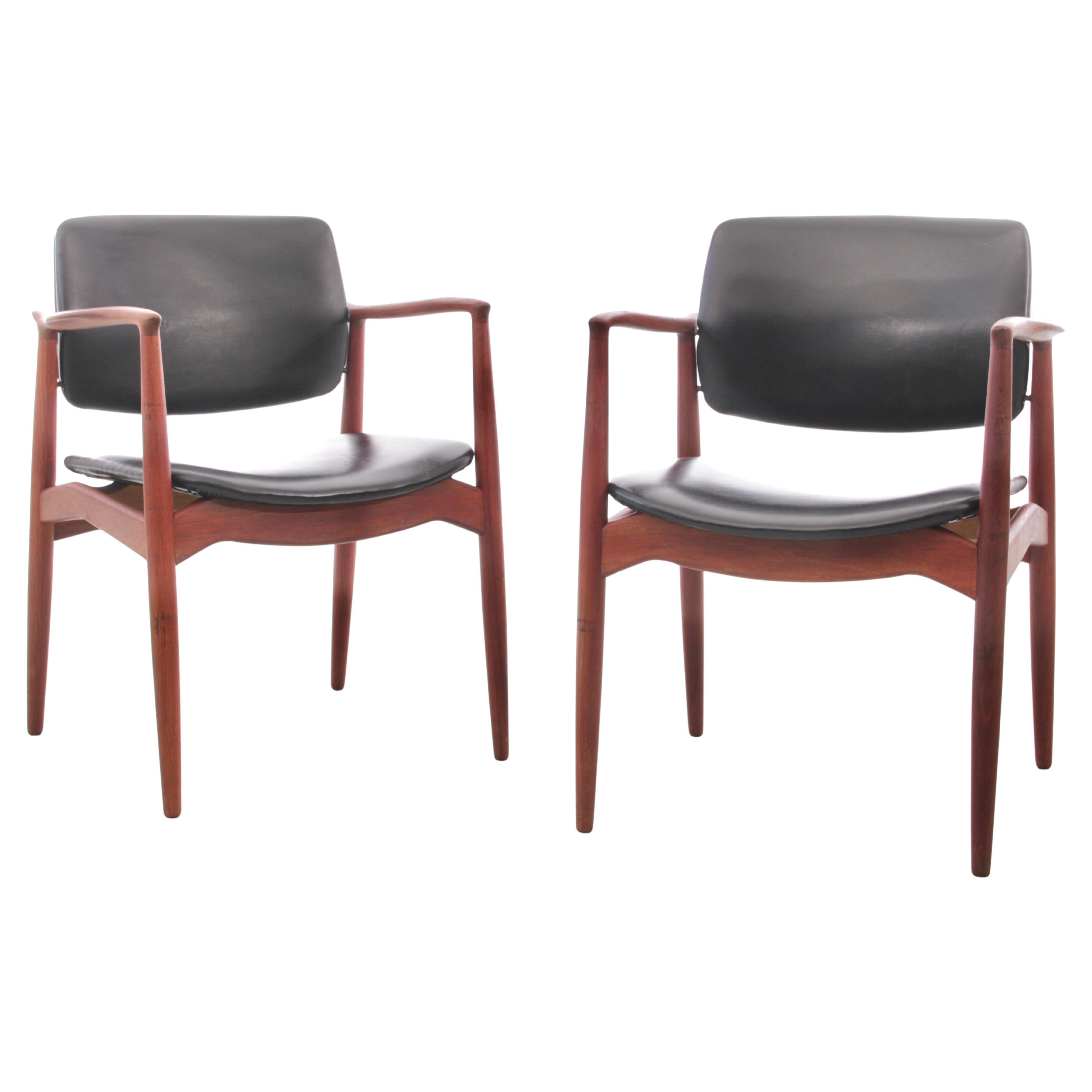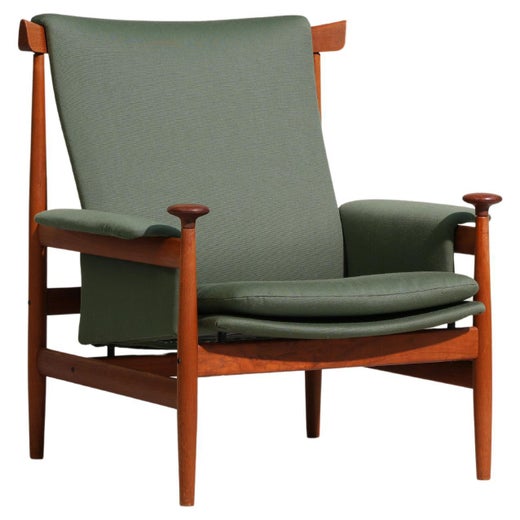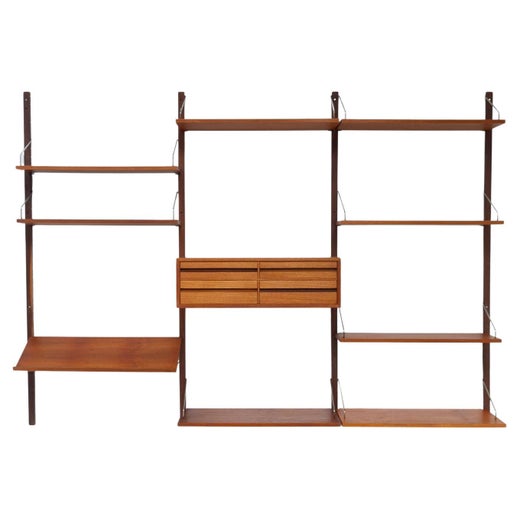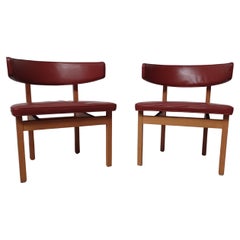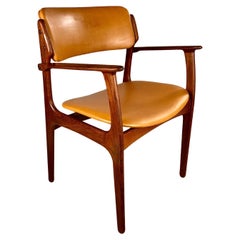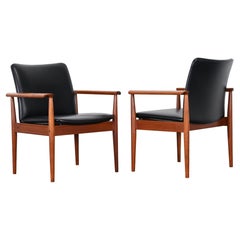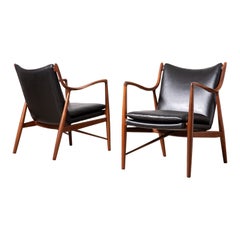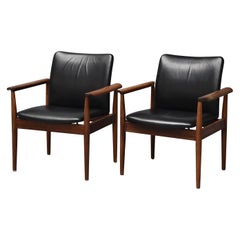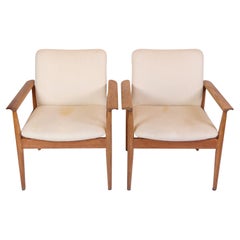1960s Finn Juhl Set of Two Fully Restored Armchairs in Teak and Leather by Cado
About the Item
- Creator:
- Dimensions:Height: 32.68 in (83 cm)Width: 27.17 in (69 cm)Depth: 25.6 in (65 cm)Seat Height: 16.93 in (43 cm)
- Sold As:Set of 2
- Style:Scandinavian Modern (Of the Period)
- Materials and Techniques:
- Place of Origin:
- Period:
- Date of Manufacture:1960s
- Condition:Refinished. Repaired: Frames are carefully restored. Wear consistent with age and use. Frames are carefully restored.
- Seller Location:Knebel, DK
- Reference Number:Seller: https://aleph-01.kb.dk/F/D59X37EV7XXCC6IQMNJ2L43UH7HUY7BLG5RP8T51stDibs: LU2713331613722
Finn Juhl
Along with Hans Wegner, Arne Jacobsen and Børge Mogensen, Finn Juhl was one of the great masters of mid-20th-century Danish design. Juhl was the first among that group to have his work promoted overseas, bringing the character of the nation’s furnishings — and the inherent principles of grace, craftsmanship and utility on which they were based — to an international audience.
A stylistic maverick, Juhl embraced expressive, free-flowing shapes in chair, credenzas and sofa designs much earlier than his colleagues, yet even his quietest pieces incorporate supple, curving forms that are at once elegant and ergonomic.
As a young man, Juhl hoped to become an art historian, but his father steered him into a more practical course of study in architecture. He began designing furniture in the late 1930s, a discipline in which, despite his education, Juhl was self-taught, and quite proud of the fact.
Juhl’s earliest works, designed in the late 1930s, are perhaps his most idiosyncratic. The influence of modern art is clear in his 1939 Pelican chair: an almost Surrealist take on the classic wing chair. Critics reviled the piece, however; one said it looked like a "tired walrus." Juhl had tempered his creativity by 1945, when the workshop of Danish cabinetmaker Niels Vodder began to issue his designs. Yet Juhl’s now-classic NV 45 armchair still demonstrates panache, with a seat that floats above the chair’s teak frame.
Juhl first exhibited his work in the United States in 1950, championed by Edgar Kaufmann Jr., an influential design critic and scion of America’s most prominent family of modern architecture and design patrons. (Kaufmann’s father commissioned Frank Lloyd Wright’s design of the house “Fallingwater.”)
Juhl quickly won a following for such signature designs as the supremely comfortable Chieftan lounge chair, the Judas table — a piece ornamented with stylish inlaid silver plaquettes — and the biomorphic Baker sofa. After an article authored by Kaufmann on Juhl and his work appeared in the U.S.-based magazine Interiors in 1948, he began receiving American commissions.
Kaufmann commissioned Juhl to create the exhibition design for, and contribute pieces to, the 1951 edition of the Good Design shows he organized for MoMA and Chicago’s Merchandise Mart. Baker Furniture asked Juhl to design for the firm, and he produced a collection of chairs, tables and cabinets, and, later, the 1957 sofa.
Scandinavian modernist seating, such as the chairs and sofas Juhl created for Baker, became immensely popular in postwar America, as the seeds of the Scandinavian style that Juhl sowed took root and spread in the United States. Juhl and his work featured prominently in the landmark show “Design from Scandinavia,” which opened in 1954 at the Virginia Museum of Fine Arts and traveled to 24 museums in the U.S. and Canada; over three years, it was seen by more than a million people.
Juhl’s furniture — as well as his ceramics, tableware and accessories — has an air of relaxed sophistication and elegance that is unique in the realm of mid-century design.
Find vintage Finn Juhl armchairs, coffee tables, desks and other furniture for sale on 1stDibs.
Cado
While Danish furniture company Cado is popular among collectors of Scandinavian modern furniture for its well-crafted chairs, sofas, coffee tables and dining tables, the brand is best known for its sculptural wall shelving systems created by renowned Danish designer Poul Cadovius (1911–2011), Cado's founder.
The Copenhagen-born Cadovius initially studied to be an upholsterer and saddler before pursuing furniture design. He began his career in the 1940s making Venetian blinds and other window treatments before shifting his focus toward designing versatile furnishings that could be adapted to all sorts of interior spaces.
In 1945, Cadovius founded the furniture manufacturer Royal System intending to produce his designs for postwar homeowners. His visionary works included the 1948 Royal System shelving unit, a space-saving solution that underscored Cadovius’s penchant for problem-solving in a multifunctional way. Rather than balance shelves on wooden or metal legs, it held them to the wall with brackets. The wall unit was practical and functional, but it was also decorative, made of rich and exotic woods like walnut, rosewood and teak, a favorite wood of Cadovius’s and a highly sought-after material among mid-century modern designers.
Cadovius established Cado in the late 1950s. The manufacturer followed the Royal System shelving unit with several other modular storage designs including the System Ultra in 1957, System Cado in 1960 and System Abstracta in 1962. Two years later, with more than 400 patents to his name, Cadovius purchased premier Danish furniture manufacturer France & Søn and incorporated it into Cado.
Throughout the 1960s and 1970s, Cado collaborated with influential Danish and European designers of the era such as Steen Østergaard, best known for his stackable Cado 290, a Space Age fiberglass-and-polyamide nylon lounge chair; Finn Juhl, a stylistic maverick who embraced expressive, free-flowing shapes in chair and sofa designs much earlier than his colleagues; and Ole Wanscher, who drew on Shaker furniture and Chippendale forms and created the widely loved Colonial chair and coffee table for P. Jeppesens Møbelfabrik.
Cadovius’s designs — as well as the other works manufactured by Cado — are widely coveted by vintage furniture enthusiasts all over the world. In 2018, the Danish brand dk3 reissued the Royal System as well as a more compact version.
On 1stDibs, discover a range of vintage Cado case pieces and storage cabinets, seating and tables.
- ShippingRetrieving quote...Shipping from: Knebel, Denmark
- Return Policy
More From This Seller
View AllVintage 1960s Danish Scandinavian Modern Armchairs
Teak
Vintage 1960s Danish Scandinavian Modern Armchairs
Leather, Teak
Vintage 1960s Danish Scandinavian Modern Chairs
Oak
Vintage 1950s Danish Scandinavian Modern Chairs
Leather, Teak
Vintage 1960s Danish Scandinavian Modern Armchairs
Leather, Mahogany
Vintage 1970s Danish Scandinavian Modern Armchairs
Mahogany
You May Also Like
Vintage 1960s Mid-Century Modern Chairs
Upholstery, Teak
Vintage 1950s American Scandinavian Modern Lounge Chairs
Leather, Walnut
Vintage 1960s Danish Scandinavian Modern Armchairs
Leather, Hardwood
Vintage 1960s Danish Mid-Century Modern Armchairs
Wool, Teak
Vintage 1950s Danish Mid-Century Modern Armchairs
Brass
Vintage 1950s Scandinavian Scandinavian Modern Armchairs
Leather, Teak
